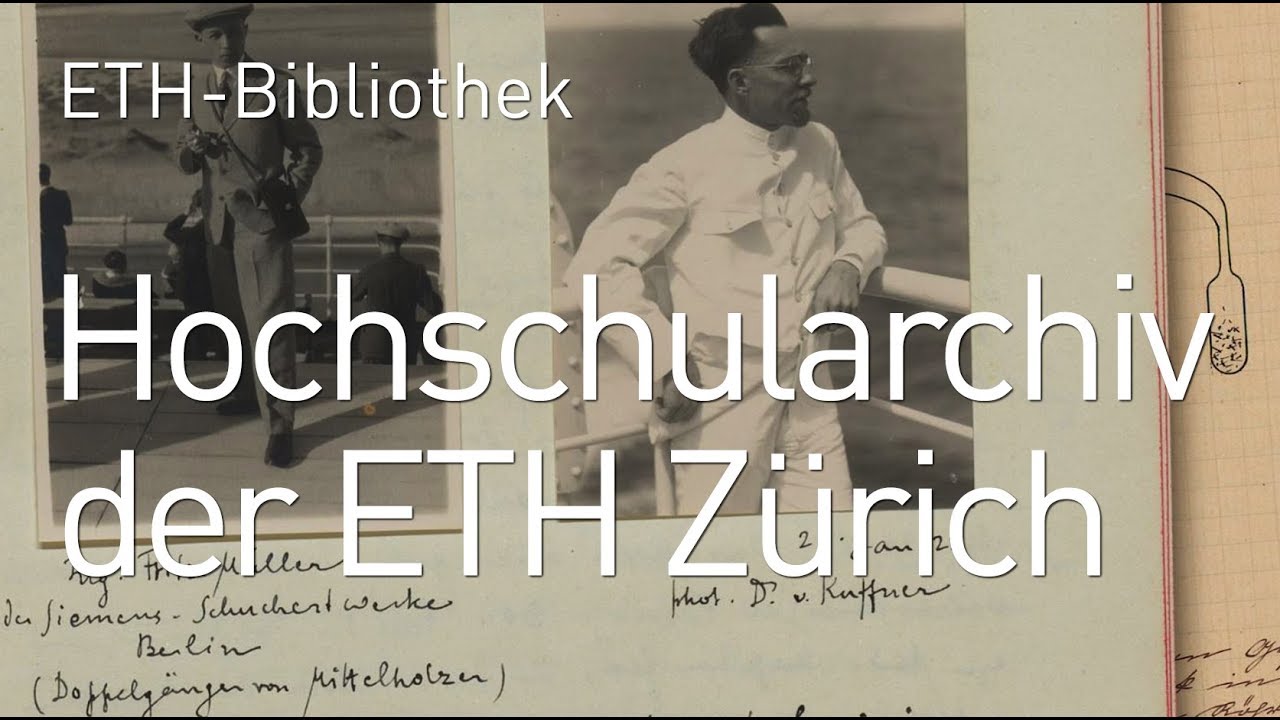ETH Zurich University Archives (original) (raw)
As the “Memory of ETH Zurich”, the University Archives is open to researchers and all interested parties. Responsible for organizing, preserving, and providing access to information and records of lasting value of ETH Zurich and the ETH Board, it also looks after personal papers relating to science and items documenting scientific and university history.

By playing the video you accept the privacy policy of YouTube.Learn more OK
Administrative archives
Since its foundation in 1999, the ETH Zurich University Archives has systematically taken responsibility for archival-worthy documents from the administration of ETH Zurich and the ETH Board. In some cases, older records had already been handed over to the ETH Library before the Archives was founded, and are part of the personal papers collection of ETH Zurich University Archives.
- Presidential decrees, minutes of meetings and records of the Swiss University Council (1854 to 1992)
- Records from organisational units of the ETH Board (since 1993)
- Records from the Executive Board and organisational units of ETH Zurich (since 1854)
Consultation services for ETH units
- Pre-archival consultation: The ETH Zurich University Archives advises organisational units on the maintenance and development of conventional record systems as well as on digital records management and supports them in fulfilling their part of duties in accordance with the external page Federal Act on Archiving (ArchA).
- Long-term preservation of digital documents: The ETH Zurich University Archives also accepts and processes genuinely digital records from the organisational units of ETH Zurich and the ETH Board and ensures the long-term curation and accessibility of digital data of archival value in collaboration with the Office for Research Data Management and Digital Curation.
Find out more about the procedure for offering and transferring documents and data to the ETH Zurich University Archives as well as information on records management at ETH Zurich on our special pages:
Personal papers, donations, individual acquisitions
Ever since it was founded, the ETH Library has received documents from former ETH members through donations. In exceptional cases, items of particular value to ETH Zurich may be purchased. In addition, the University Archives also acquires archives of associations and societies that are closely affiliated with ETH Zurich.
The personal papers include documents in various forms and formats by scientists from almost all fields of research at ETH Zurich.
Selection:
- Industrial psychology, psychology: C.G.Jung Papers Collection, Hans Biäsch
- Astronomy: Rudolf Wolf, Alfred Wolfer, Max Waldmeier
- Civil engineering: Karl Culmann, Robert Maillart, Fritz Stüssi
- Chemistry: Richard Willstätter, Vladimir Prelog, Leopold Ruzicka
- Geology and natural sciences: Arnold Escher von der Linth, Oswald Heer, Louis Rollier, Karl Mayer-Eymar, Albert Heim, Arnold Heim
- Mathematics: Paul Bernays, Wilhelm Fiedler, Heinz Hopf, Adolf Hurwitz, Hermann Weyl, Eduard Stiefel, Heinz Rutishauser, George Pólya
- Physics: Erwin Schrödinger, Carl Seelig’s Albert Einstein Documentation, Wolfgang Pauli (in addition to the holdings of the external page Pauli Archives at CERN)
- Student associations: Association of Students at ETH (VSETH), Architektura, Association of Students of Mathematics and Physics at ETH Zurich
- Scientific societies: Society for the Promotion of Research, Physical Society Zurich, Swiss Mathematical Society
- Subject-based archives that are relevant in terms of content: Archives of the History of Nuclear Energy in Switzerland (business documents of Kaiseraugst Nuclear Power Plant and records of important stakeholders), Gotthard Railway Records
Research, access and use
The ETH Zurich University Archives is pursuing an offensive digitisation strategy, but a large part of the holdings is not yet digitally accessible on the Internet. You should therefore take note of the following information on research, access and use:
- You can search for processed archival materials on external page ETH Library @ swisscovery or on University Archives Online.
- Selected personal papers are listed in inventories that can be ordered in printed form on ETH Library @ swisscovery or viewed electronically.
- Personal Papers and Autographs are continuously being digitised and are accessible on the external page e-manuscripta platform if permitted by the legal terms and conditions.
- The full text of the minutes of the Swiss School Board meetings are freely accessible at Schulratsprotokolle Online.
- Archival material that has not yet been digitised is available for consultation in the or by using a form. Advance registration is requested.